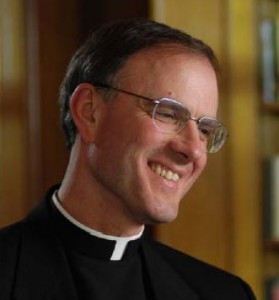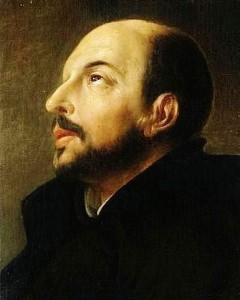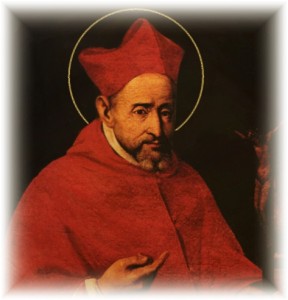Episode 1 Praying with Scripture: Christian Contemplation and Mediation in the Ignatian tradition with Fr. TimothyÂ
Fr. Gallagher introduces us to meditation and contemplation – the cornerstones of Ignatius of Loyola’s spiritual practice.
[powerpress]
For other episodes in the series visit The Discerning Hearts “Praying with Scripture†page
Father Timothy M. Gallagher, O.M.V., was ordained in 1979 as a member of the Oblates of the Virgin Mary, a religious community dedicated to retreats and spiritual formation according to the Spiritual Exercises of St. Ignatius. Â Fr. Gallagher is featured on the EWTN series “Living the Discerning Life: Â The Spiritual Teachings of St. Ignatius of Loyola”.
For more information on how to obtain copies of Fr. Gallaghers’s various books and audio which are available for purchase, please visit  his  website:   frtimothygallagher.org
 For the other episodes in this series check out Fr. Timothy Gallagher’s “Discerning Hearts†page
Tags: catholic, catholic podcast, catholic prayer, cathollc spirituality, Christian Contemplation, contemplation, discerning heart, Discerning Hearts, Father Timothy M. Gallagher, Gallagher, Ignatian tradition, meditation, scripture, spiritual exercises, spiritual formation, st. ignatius, st. ignatius of loyola, Timothy Gallagher
This entry was posted on Monday, June 16th, 2014 at 7:11 am
You can follow any responses to this entry through the RSS 2.0 feed.
.
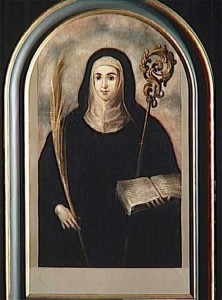 see also Pope Benedict’s teachings on St. Gertrude on the Discerning Hearts Holy Women page
see also Pope Benedict’s teachings on St. Gertrude on the Discerning Hearts Holy Women page
(1256-1302 A.D.) Few men have merited the title, “the Great”; fewer women. I know of only one nun so honored, St. Gertrude of Helfta, a mystic whose spiritual writings have remained influential up to the present.
Nothing is known of this German woman’s family background. When five years old, she was entrusted to the sisters of Helfta Abbey to be educated. From a very young age she gave evidence of her brilliance and quickly outstripped her companions. In her teen years she asked to join the community. Therefore, she probably spent her whole life from childhood on within the abbey walls.
Her love for secular studies made the common life wearisome, pride and vanity ate away at her soul and she soon became an unhappy young woman until Christ appeared to her. The day was branded in her memory, it was in her 26th year, when as she says “in a happy hour, at the beginning of twilight, thou O God of truth, more radiant than any light, yet deeper than any secret thing, determined to dissolve the obscurity of my darkness.” From then on her biographer tells us “she became a theologian instead of a grammarian.” She did not give up her intellectual ardor but now, all her labors were for her sisters, to cure what she termed “the wound of ignorance”. Her many gifts and mystical graces did not prevent her from giving herself wholeheartedly to the common life with its joys and sorrows. In fact many of her special graces came to her as she took part in the ordinary routine of convent life. She felt keenly for those whose burdens involved them in distracting duties, for example those responsible for meeting the debts of the monastery.
She prayed that they might have more time to pray and fewer distractions. The Lord’s answered “It does not matter to me whether you perform spiritual exercises or manual labor, provided only that your will is directed to me with a right intention. If I took pleasure only in your spiritual exercises, I should certainly have reformed human nature after Adam’s fall so that it would not need food, clothing or the other things that man must find or make with such effort.”
Many of her writings are lost, but fortunately she left to the world an abundance of spiritual joy in her book The Herald of Divine Love, in which she tells of the visions granted her by our divine Lord. She wrote this excellent, small book because she was told that nothing was given to her for her own sake only. Her Exercises is an excellent treatise on the renewal of baptismal vows, spiritual conversion, religious vows, love, praise, gratitude to God, reparation, and preparation for death.
She began to record her supernatural and mystical experiences in what eventually became her Book of Extraordinary Grace (Revelation of Saint Gertrude), together with Mechtilde’s mystical experiences Liber Specialis Gratiae, which Gertrude recorded. Most of the book was actually written by others based on Gertrude’s notes. She also wrote with or for Saint Mechtilde a series of prayers that became very popular, and through her writings helped spread devotion to the Sacred Heart (though it was not so called until revealed to St. Margaret Mary Alocoque).
Gertrude is inseparably associated with the devotion to the Sacred Heart. The pierced hear
t of Jesus embodied for her the Divine Love, an inexhaustible fountain of redemptive life. Her visions and insights in connection with the Heart of Jesus are very enlightening. In one such intellectual vision, she perceived the unceasing love of Christ for us in two pulsations of his Heart – one accomplished the conversion of sinners, the other the sanctification of the just. Just as our own faithful heart keeps right on whether we advert to it or not, these pulsations will endure till the end of time despite the vicissitudes of history.
Our Lord wishes people to pray for the souls in purgatory. He once showed Gertrude a table of gold on which were many costly pearls. The pearls were prayers for the holy souls. At the same time the saint had a vision of souls freed from suffering and ascending in the form of bright sparks to heaven.
In one Vision, Our Lord tells Gertrude that he longs for someone to ask Him to release souls from purgatory, just as a king who imprisons a friend for justice’s sake hopes that someone will beg for mercy for his friend. Jesus ends with:
“I accept with highest pleasure what is offered to Me for the poor souls, for I long inexpressibly to have near Me those for whom I paid so great a price. By the prayers of thy loving soul, I am induced to free a prisoner from purgatory as often as thou dost move thy tongue to utter a word of prayer.” (more…)
Tags: benedictine, catholic, catholic podcast, catholic prayer, cathollc spirituality, devotion, family, jesus christ, love, mystic of the Church, mystical experiences, sacred heart, sacred heart of jesus, spiritual exercises, spiritual writings, st gertrude, women of the middle ages
This entry was posted on Wednesday, November 16th, 2011 at 2:30 am
You can follow any responses to this entry through the RSS 2.0 feed.
“His ‘Controversial Works’ or ‘Disputationes’ are still a valid point of reference for Catholic ecclesiology”, said the Holy Father. “They emphasise the institutional aspect of the Church, in response to the errors then circulating on that topic. Yet Bellarmine also threw light on invisible aspects of the Church as Mystical Body, which he explained using the analogy of the body and soul, in order to describe the relationship between the interior richness of the Church and her visible exterior features.
“In this monumental work, which seeks to categorise the various theological controversies of the age, he avoids polemical and aggressive tones towards the ideas of the Reformation but, using the arguments of reason and of Church Tradition, clearly and effectively illustrates Catholic doctrine.
“Nonetheless”, the Pope added, “his true heritage lies in the way in which he conceived his work. His burden of office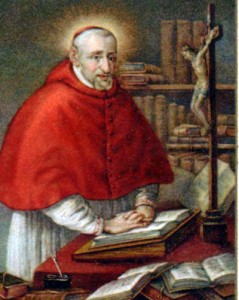 did not, in fact, prevent him from striving daily after sanctity through faithfulness to the requirements of his condition as religious, priest and bishop. … His preaching and catechesis reveal that same stamp of essentiality which he learned from his Jesuit education, being entirely focused on concentrating the power of the soul on the Lord Jesus, intensely known, loved and imitated”.
did not, in fact, prevent him from striving daily after sanctity through faithfulness to the requirements of his condition as religious, priest and bishop. … His preaching and catechesis reveal that same stamp of essentiality which he learned from his Jesuit education, being entirely focused on concentrating the power of the soul on the Lord Jesus, intensely known, loved and imitated”.
In another of his books, “De gemitu columbae” in which the Church is represented as a dove, Robert Bellarmine “forcefully calls clergy and faithful to a personal and concrete reform of their lives, in accordance with the teachings of Scripture and the saints. … With great clarity and the example of his own life, he clearly teaches that there can be no true reform of the Church unless this is first preceded by personal reform and conversion of heart on our part”.
“If you are wise, then understand that you were created for the glory of God and for your eternal salvation”, said the Pope quoting from one of the saint’s works. “Favourable or adverse circumstances, wealth and poverty, health and sickness, honour and offence, life and death, the wise must neither seek these things, nor seek to avoid them per se. They are good and desirable only if they contribute to the glory of God and to your eternal happiness, they are bad and to be avoided if they hinder this”.
The Pope concluded: “These words have not gone out of fashion, but should be meditated upon at length in order to guide our journey on this earth. They remind us that the goal of our life is the Lord. … They remind us of the importance of trusting in God, of living a life faithful to the Gospel, and of accepting all the circumstances and all actions of our lives, illuminating them with faith and prayer”.
Published by VIS – Holy See Press Office
Tags: catholic, catholic podcast, catholic prayer, cathollc spirituality, doctor of the church, spiritual exercises, st robert bellarmine
This entry was posted on Wednesday, February 23rd, 2011 at 8:54 am
You can follow any responses to this entry through the RSS 2.0 feed.

